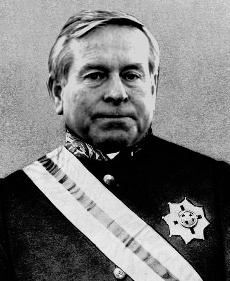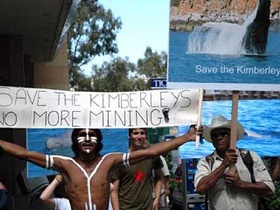Compulsory acquisition provides state and local governments with the power to acquire land with or without the owners’ agreement, provided they are compensated. It is supposed to be the claiming of land owned by an individual to be used for the benefit of the public. In other words, it is the need of an individual versus the need of the community. But the latest case of compulsory acquisition in Western Australia is being done for a totally different purpose: profits of the minority rich and powerful over the majority working people.
Premier Colin Barnett announced in early September the compulsory acquisition of James Price Point in the Kimberley region in northern WA for a large natural gas project planned by oil and gas giant Woodside and joint venture partners Shell, Chevron, BP and BHP Billiton. Negotiations began in 2007 between the state government, the Kimberley Land Council representing the traditional owners and Woodside. Although an in-principle deal was signed in April last year, no formal agreement has been reached. Not only does the project raise cultural and environmental issues, there is a much more cost-effective alternative of piping gas from the Browse Basin south to the Pilbara, according to a recent JP Morgan report.
This is hardly the first time the WA government has attempted something like this against the Indigenous people. About 30 years ago, the Noonkanbah Station dispute was sparked by similar circumstances. The remote station grabbed national and international attention when it became the subject of discussion between the local government and the Aboriginal leaders of the area. The Indigenous people tried to resist oil drilling proposed by the government in the interest of the large corporations. Although they failed at the end, their resistance and courage were acknowledged by the whole world.
The James Price Point situation is no different. Barnett’s announcement of compulsory acquisition backfired. Before the announcement, the Aboriginal leaders had some disagreements among themselves – some wanted to continue discussion with Woodside and the government, while others wanted to end them due to spiritual and environmental concerns. But the announcement seems to have reunited the Aboriginal leaders, who are all now against the project.
Former Australian of the Year and Indigenous leader Mick Dodson expressed his view on the announcement: “I think compulsory acquisition is, in a sense, another act of colonialism; it’s another theft of our land; it’s another invasion. It should never ever be contemplated at a political level.”
Renowned musician John Butler said: “Barnett, Woodside and their mates are, sadly, so out of touch with what’s really important to the Australian public that they think taking this sacred land without permission and building a big smelly, toxic industrial precinct on it is a good idea. I think it’s time for a big wake-up call.”
Protests against the announcement have already begun. Broome locals paddled a kayak flotilla to Woodside’s rig, in an attempt to tow the rig away and let the government know their message: “Save the Kimberley – No gas on the Kimberley coast”. Waves of protests may follow if the compulsory acquisition goes ahead and work begins on site.
Many people are asking: what if it were the Great Barrier Reef instead of Noonkanbah or James Price Point? Would the government make the same decision against the interests of the majority? Will the majority remain silent or fight back?


